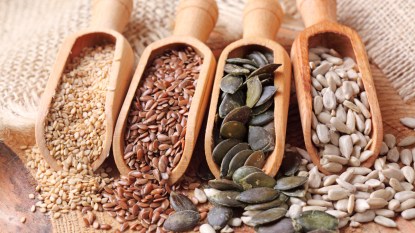Simple Carbs Can Cause Bad Breath (Plus: 3 Other Stinky Culprits and How to Fix)
Research-based tips to keep your breath fresh.

Most of us worry at least once a week that our breath isn’t as fresh as we’d like. Whether you have morning breath, bad breath after eating certain foods, or dry mouth, it’s easier than you think to figure out the issue and find the right solution. Don’t know where to begin? We did — with scientific news. Thankfully, these research-based tips outsmart the root causes of bad breath while keeping gums healthy.
Morning breath?
Cooler, dryer air slows saliva production as you sleep, creating a breeding ground for bacteria on your tongue. The fix: Follow morning brushing with two sweeps of a stainless steel tongue scraper. It lifts away 75 percent of the bacteria responsible for bad breath, research in the Journal of Periodontology says. Plus, molecules in the steel lock onto odor-causing sulfur molecules and whisk them away.
Worse after eating?
If you notice funky breath after savoring cider donuts or pretzels, carbs are likely the cause. They convert to sugars that collect around gums and feed bacteria. Swishing with a sage and sea salt tonic can help. Scientists from the Tamil Nadu Government Dental College and Hospital in India say sea salt is more effective than prescription mouthwash at eliminating compounds responsible for bad breath. And a scientific review in Pharmaceutics credits sage with destroying up to 92 percent of odor-producing microbes. To do: Pour 5 ounces of boiling water over 5 sage leaves; add one teaspoon of sea salt. Let cool, then swish with 1 ounce for 1 minute daily after eating.
Dry mouth?
Scientists from the University of Melbourne in Australia say the production of the salivary glands drops with menopause, upping the risk of chronic dry mouth (a bad breath trigger). To thwart trouble, try French pine bark. A study published in Minerva Stomatologica found a 150-milligram daily dose improves microcirculation to salivary glands, boosting saliva production significantly in two weeks.
Mystery halitosis?
If a sulfur smell lingers, GERD may be to blame, according to research in the Journal of General Internal Medicine. This type of chronic acid reflux occurs when GI gasses escape into the throat, causing an odor. One remedy: Stir a scoop of ground flaxseed into a glass of cool water and sip before a big meal. Research has found that boosting your intake of fiber, like flax, calms the GERD symptoms that cause bad breath as effectively as meds.
Bonus Tips
Drink a cup of green tea: Sipping a cup of green tea after eating helps reduce bad-breath bacteria, a study from the ISRN Preventive Medicine journal reports.
Add a pillow: Sleeping with an extra pillow under your head quashes bad breath. The position encourages you to breathe through your nose, research from the Sleep & Breathing journal says, blocking bacteria from lodging along your gums as you sleep. The payoff: Related research suggests 90 percent of folks who breathe through their nose experience all-day freshness.
A version of this article originally appeared in our print magazine, Woman’s World.













